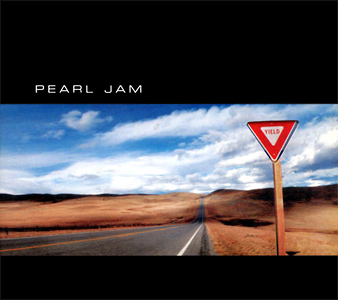Pearl Jam’s fifth studio album Yield was released on February 3rd, 1998. In a few more years,
babies born on that date will be old enough to drive and hopefully experience this album the way I did when I was finding my way in this crazy modern world. I had been a fan of Pearl Jam ever since MTV imposed them upon my generation early in 1992 - I was 16. To me they were more than just a cool band with some catchy songs; they took on the world's insanity through dynamic, soul-bearing music. After the hype that made "grunge" king was refocused on watered down "post-grunge", Yield was there to take rock music to a level no marketing department could ever dream of.
Like any great album, Yield is an ideal road trip album. It’s even got a picture of a road on the cover, and not just any road, but an open highway. And yet, there’s a yield sign on the side of this highway. Open the cover, and you’ll see the yield sign in the middle of an ocean. Huh? I suppose the message is that no matter how clear the road (or water way) is ahead, something can still ruin your day. Always be prepared to yield.

Brain of J starts the album off by blazing a trail of fiery discontent with scorching guitars and its mocking chorus: “the whole world will be different soon, the whole world will be relieved”. Faithfull, intentionally misspelled with two l’s, is full of everything that makes this album great (details to come). No Way is a mid-tempo powerhouse, in which the album's philosophical discussion gets as heavy as its groove. Given to Fly, a concert staple for good reason, tickles your eardrum with its prickly guitar lick and then picks you up with each huge chorus, making you feel like the human being in the sky it describes. Wishlist ponders being an alien at home behind the sun as it floats you back down to earth. Pilate is a battle between quiet meditation and angsty funk. Do the Evolution is a wild riff fest, and perhaps the most heartfelt sarcasm ever recorded. The next track, represented on the back cover as a red dot, is a weird little percussive jam with the message that “we’re all crazy at war.” MFC (‘mini fast car’) smartly justifies getting out of Dodge with the line “There’s a lot to be said for nowhere”. Low Light is another one of Pearl Jam’s most beautiful moments. In Hiding is the album’s majestic high point and a really difficult song to sing. Push Me, Pull Me is lyrically at odds with the nature of reality and sonically at odds with all the trends of the 90’s or any decade before that - pretty cool. Finally, we have All Those Yesterdays reminding us to let each day wash away. Except it’s not done yet, because as if to remind listeners to yield to the unpredictable, a Middle Eastern styled ditty about hummus reveals itself as a hidden track.
Yield is Pearl Jam’s best work in the studio and producer Brendan O’Brien deserves all due credit. The guitars are layered together dynamically, and everything from raw crunch, fiery wail, funky twang and clean-toned prettiness is delivered with sonic excellence. The bass sound is a warm undercurrent and Jack Irons’ drumming gels with the band even better than it did on No Code (his first album and only other album with them), creating hypnotic rhythms with just the right amount of spazziness. Above it all is Eddie’s voice, still full of youthful pride and still unashamed to unleash rage, but with newfound maturity and a healthy dose of humility. For the first time on a Pearl Jam album, Vedder sang lyrics that were not his own (four of the songs’ lyrics were penned by either bassist Jeff Ament or guitarist Stone Gossard), but you would never question that he believed in them.
It’s not as haunting as Vitalogy, not as emotional as Ten and not as contemplative as their later albums, but Yield is an equal blend of everything that has made Pearl Jam great over the years. Take a long drive with it if you can.